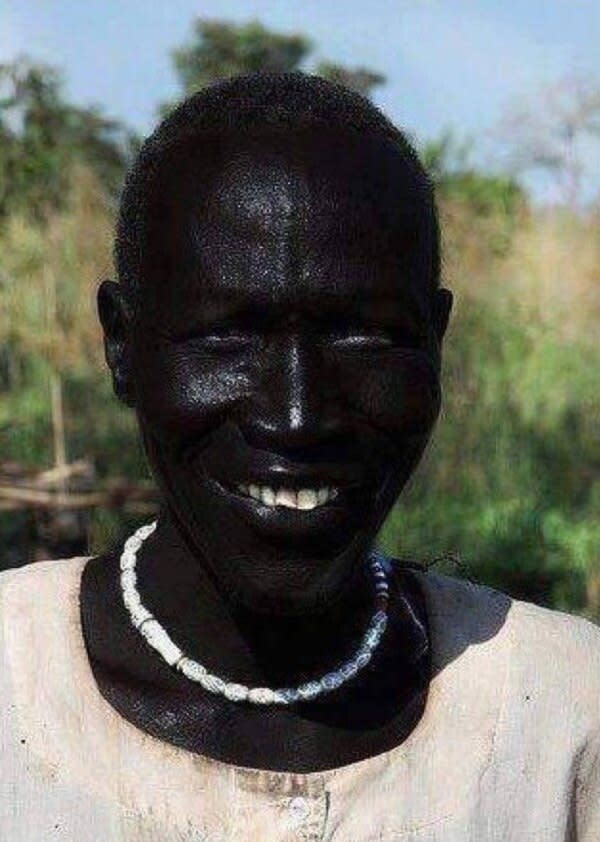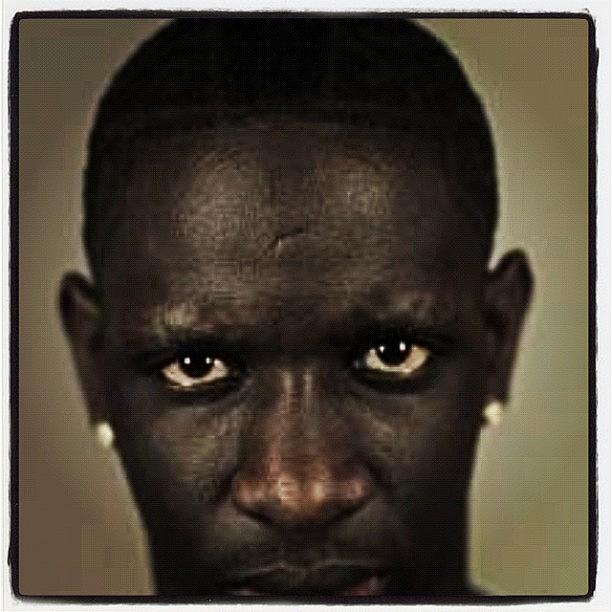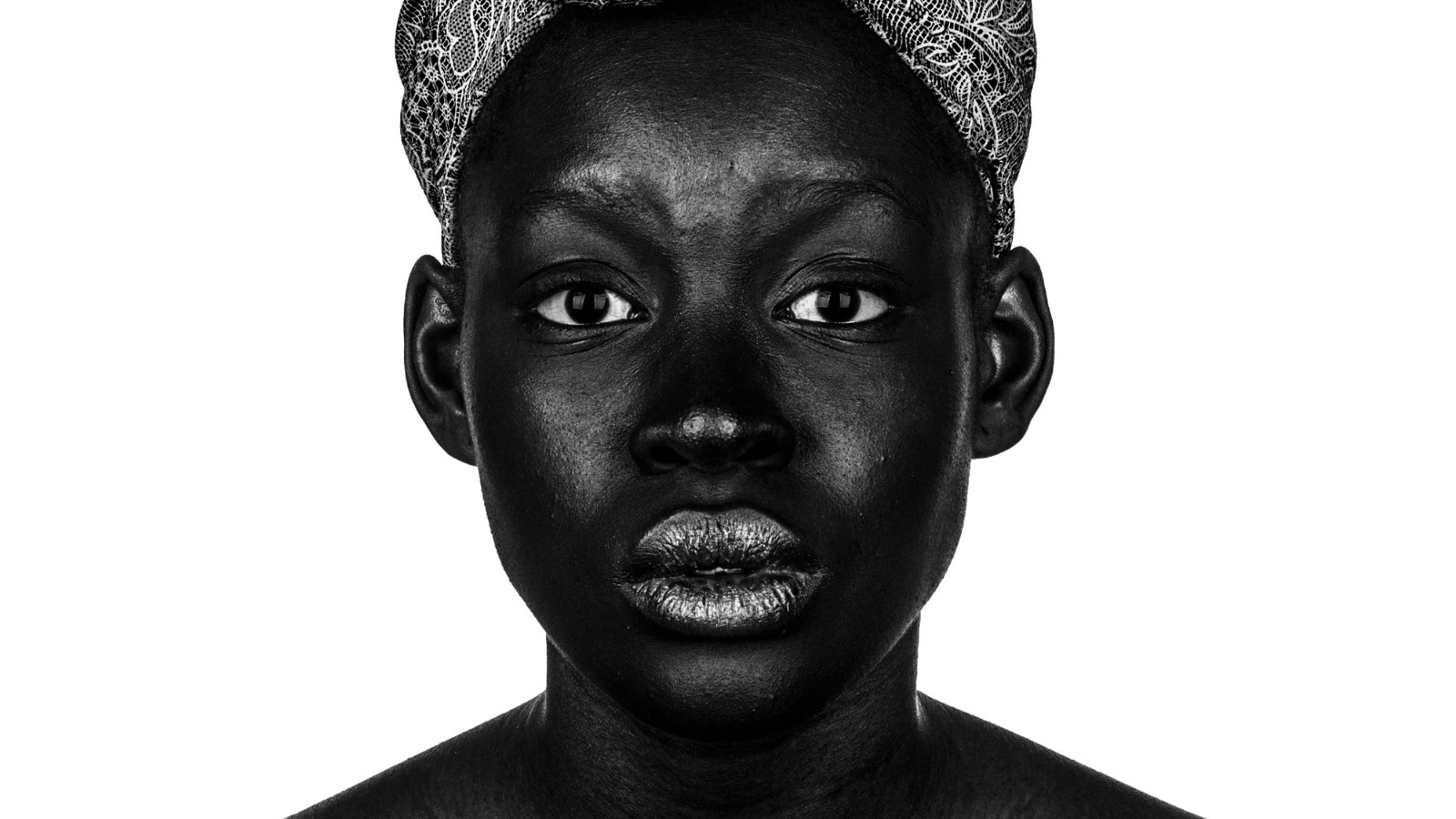Understanding The 'Blackest Person In The World' Phenomenon: Beyond Viral Pictures And Records
There’s a certain curiosity that sparks whenever someone stands out, especially when it comes to human features. For some time now, the idea of the “blackest person in the world” has really captured people’s attention online, sparking countless discussions and sharing of photos. It’s a very interesting topic, and it just seems to keep coming up, doesn't it? People around the globe have, in a way, been fascinated by individuals whose skin tone appears exceptionally deep.
This widespread interest often comes from viral images, like the one of an African man believed by many to be the darkest on Earth, which just spread like wildfire. These pictures, it's almost as if, they spark conversations about beauty, uniqueness, and what it even means to be "the blackest." Yet, there's a big question that often gets overlooked in all the excitement: is this idea even something we can officially measure?
Our research shows that while the internet buzzes with candidates, there is no Guinness World Record for the blackest person in the world. This question isn’t just about how someone looks—it actually touches on identity, culture, and science, too. It makes us think about how we see skin color and the deeper meanings we attach to it, which is pretty significant, really.
- Hannah Love Is Blind
- What Does Ig Mean
- Drew Pritchard Divorce
- Jackerman Mother Warmth
- Shut Up In Spanish
Table of Contents
- The Quest for the "Blackest Person in the World"
- Candidates for the Title
- The Science of Skin Tone
- Racial Constructs and Human Identity
- Frequently Asked Questions (FAQ)
The Quest for the "Blackest Person in the World"
Viral Sensations and Online Buzz
In our connected world, a single image can travel everywhere in moments. This is what happened when a picture of an African man went viral, with people claiming him to be the darkest man on Earth. It just created a huge amount of discussion, you know? The internet, it seems, has a way of turning unique individual traits into global talking points. These discussions often highlight individuals like the South Sudanese model Nyakim Gatwech, who has also gained considerable attention for her striking deep skin tone, and Felix Miner from the Democratic Republic of the Congo.
These viral moments, in a way, show how much people are drawn to extremes and unusual qualities. Netizens, as a matter of fact, have managed to find some candidates who, in their eyes, deserve to receive the title of "blackest person in the world." It's a rather informal competition, driven by public fascination and the sharing of compelling photographs. The sheer volume of these discussions, too, shows a collective curiosity about human diversity.
Why No Official Record Exists
Despite the widespread interest and the internet's search for a title holder, there's no official Guinness World Record for the blackest person in the world. This is because, as our information states, the Guinness World Records does not monitor records for skin tone. There are good reasons for this policy, you know?
- Two Person Yoga Poses
- Moth Grow A Garden
- Ap Classroom Unit 6 Progress Check Mcq Answers Ap Lang
- Boo Did I Scare You Im A Job Application
- Remoteiot P2p Download
Measuring skin tone objectively and universally is incredibly difficult. Skin color is a complex biological trait, influenced by many factors, and it varies greatly even within individuals. Furthermore, assigning a "blackest" title could, arguably, lead to harmful comparisons or even promote a kind of ranking based on physical appearance, which is not really what Guinness aims to do. Their focus is on measurable, often performance-based, achievements, and skin tone just doesn't fit that criteria, which is understandable.
Candidates for the Title
Even though there’s no official record, the internet has, as I was saying, put forward a few individuals who are often mentioned in discussions about exceptionally deep skin tones. These people have become, in some respects, public figures in this informal quest.
Nyakim Gatwech: A Model's Story
Nyakim Gatwech, a South Sudanese model, has become a very prominent figure in these conversations. She's often celebrated for her deep skin tone and has, in a way, used her platform to promote self-acceptance and challenge conventional beauty standards. Her presence in the fashion world is a powerful statement about diversity and the beauty of all shades, which is pretty inspiring, actually.
Nyakim's journey has inspired many, showing that true beauty comes in many forms. She has, you know, embraced her unique appearance and has become an advocate for people with darker skin, encouraging them to love their natural complexion. Her story, too, highlights the cultural significance and personal pride associated with deep skin tones.
Personal Details: Nyakim Gatwech
| Known For | Model, Advocate for Diversity |
| Origin | South Sudan |
| Claim to Fame | Striking deep skin tone, challenging beauty norms |
Felix Miner: A Case of Measured Reflection
Felix Miner, from the Democratic Republic of the Congo, also gained attention when his skin was, apparently, measured to reflect minimal light. Our information states that his skin reflected around 0.5% of light, which is an incredibly low percentage. This led him to be recognized by some as a potential candidate for the title of "blackest person in the world."
This measurement, it seems, offers a more scientific angle to the discussion, moving beyond just visual perception. However, it's important to remember that such measurements are, in a way, snapshots and might not fully capture the complexity of skin tone. Still, his case provides a fascinating example of how technology can try to quantify human characteristics, even if the overall title remains unofficial.
Personal Details: Felix Miner
| Known For | Reported minimal light reflection from skin |
| Origin | Democratic Republic of the Congo |
| Measured Skin Reflection | Around 0.5% |
The Science of Skin Tone
To truly understand why some people have very deep skin tones, it's helpful to look at the science behind it. Skin color is, you know, a fascinating biological trait, and it's far more complex than a simple visual observation. It's a rather intricate system, really.
Melanin: The Color Maker
The primary substance responsible for human skin color is a pigment called melanin. Produced by specialized cells called melanocytes, melanin comes in different types, mainly eumelanin and pheomelanin. Eumelanin, which is a very dark brown or black pigment, is what gives skin its deeper tones. Pheomelanin, on the other hand, produces red and yellow hues.
People with very deep skin tones have a higher concentration of eumelanin in their skin cells. This is a natural adaptation, often found in populations from regions with intense sun exposure, like many parts of Africa. Melanin, you see, acts as a natural sunscreen, protecting the skin from harmful ultraviolet (UV) radiation. So, a deeper skin tone is, in some respects, a sign of remarkable biological protection, which is pretty cool, actually. You can learn more about the science of melanin and skin pigmentation in scientific studies.
Measuring Skin Color: A Complex Task
While we can use instruments to measure light reflection, as was done with Felix Miner, truly quantifying "blackness" is, well, quite a challenge. Skin color isn't just one uniform shade across the entire body; it can vary significantly from one area to another. Factors like blood flow, diet, and even the angle of light can influence how skin appears, too.
Scientists use tools like spectrophotometers to measure the amount of light reflected or absorbed by the skin. These measurements provide objective data, but they don't necessarily translate into a single, definitive "blackest" title. The perception of color is also, very, subjective, and what one person considers "blackest" might be seen differently by another. It's not a simple, straightforward thing, you know?
Racial Constructs and Human Identity
The discussion around the "blackest person in the world" isn't just about biology or viral fame; it also touches on deeper societal issues. It makes us think about how we categorize people and the history behind those categories, which is, frankly, very important.
The History of Skin Color and Society
Throughout history, skin color has, unfortunately, often been used as a basis for social hierarchy and discrimination. The concept of "race" itself is, in a way, a social construct, meaning it's an idea created by society, not a biological reality. While there are genetic differences that account for variations in skin tone, these differences are, actually, a tiny fraction of human genetic diversity.
Our article explores the long history of racial constructs, showing how societies have, sometimes, assigned meaning and value to different skin tones. This history reminds us that discussions about skin color, even when seemingly innocent, can carry echoes of past biases. It's a complex area, and one that requires a lot of thought, you know? You can learn more about our main page for related articles on human diversity.
Celebrating Every Shade
Today, there are over 7.8 billion people in the world, and everyone sees skin color differently. But no matter what shade of skin we have, whether light or dark, it’s all beautiful. The fascination with the "blackest person in the world" can, in a way, be channeled into a celebration of human diversity, rather than a quest for a singular "best" or "most extreme" example.
Individuals like Nyakim Gatwech are, as a matter of fact, helping to shift perspectives, promoting the idea that all skin tones are worthy of admiration and respect. It's about recognizing the inherent beauty in every complexion and appreciating the rich tapestry of human appearance. This perspective encourages us to look beyond simple labels and, instead, embrace the full spectrum of human beauty, which is a pretty positive thing, I think.
Frequently Asked Questions (FAQ)
People often have questions about this topic, so let's clear up some common ones:
1. Is there a Guinness World Record for the blackest person?
No, there isn't. The Guinness World Records does not monitor or recognize records for skin tone. This is because skin color is, in a way, a complex biological trait that is difficult to measure definitively, and creating such a record could, arguably, lead to harmful comparisons. It's just not something they do, you know?
2. What makes someone's skin very dark?
Very dark skin is primarily due to a higher concentration of eumelanin, a type of melanin pigment, in the skin cells. Eumelanin is a dark brown or black pigment that provides natural protection against the sun's ultraviolet (UV) rays. The amount of melanin a person produces is, basically, determined by their genetics and, sometimes, their ancestral origins in regions with high sun exposure.
3. Why do people search for the "blackest person in the world"?
People search for the "blackest person in the world" for a few reasons. There's often a natural human curiosity about extremes and unique human characteristics. Viral photos and social media discussions also, you know, fuel this interest. For some, it might also be a way to celebrate diversity or to find representation of exceptionally deep skin tones in a world that often highlights lighter complexions. It's a very human thing to be curious, after all.
The discussions around the "blackest person in the world" highlight our fascination with human diversity, the power of the internet, and the deeper conversations about identity and science. As of our last update on 2025/08/14, there is no official record, and the focus remains on celebrating the incredible spectrum of human skin tones. This conversation, you know, truly encourages us to look at beauty in all its forms and appreciate the uniqueness of every individual. For more insights into the human body and its amazing variations, you can check out this detailed article on skin tone.
- How To Screenshot On Pc
- Whats Jon Gruden Doing Now
- Jasmine Crockett Husband
- In The Clerb We All Fam
- Do A Barrel Barrel Roll

Who Is The Blackest Person In The World?

Blackest Man Alive From Psg- Heskey Photograph by Yadiel Solis

Being Nigerian in America - CNN